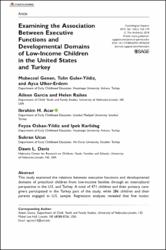| dc.contributor.author | Gonen, Mubeccel | |
| dc.contributor.author | Guler-Yildiz, Tulin | |
| dc.contributor.author | Ulker-Erdem, Ayca | |
| dc.contributor.author | Garcia, Aileen | |
| dc.contributor.author | Raikes, Helen | |
| dc.contributor.author | Acar, Ibrahim H. | |
| dc.contributor.author | Ozkan-Yildiz, Feyza | |
| dc.date.accessioned | 2019-11-24T20:35:49Z | |
| dc.date.available | 2019-11-24T20:35:49Z | |
| dc.date.issued | 2019 | |
| dc.identifier.issn | 0033-2941 | |
| dc.identifier.issn | 1558-691X | |
| dc.identifier.uri | https://dx.doi.org/10.1177/0033294118756334 | |
| dc.identifier.uri | https://hdl.handle.net/20.500.12513/1989 | |
| dc.description | WOS: 000456528000010 | en_US |
| dc.description | PubMed ID: 29436982 | en_US |
| dc.description.abstract | This study examined the relations between executive functions and developmental domains of preschool children from low-income families through an intercultural perspective in the U.S. and Turkey. A total of 471 children and their primary caregivers participated in the Turkey part of the study, while 286 children and their parents engaged in U.S. sample. Regression analyses revealed that fine motor, problem solving, and executive functions of children between two contexts were significantly different from each other. In the U.S., executive functions predicted communication, problem solving, and fine motor development, whereas in the Turkish sample, executive functions did not predict domain scores. Child gender predicted four of five developmental outcomes in the U.S., whereas maternal education predicted two of five outcomes in Turkey. In addition, invariance testing demonstrated that predictors to outcomes were not significantly different between the two countries. Country differences from the first set of outcomes were explained in the context of the research sites, children's socialization, and cultural expectations surrounding child development. This study raises questions about relations between executive functions and developmental domains for future research. | en_US |
| dc.description.sponsorship | Hacettepe University Scientific Research Unit in AnkaraHacettepe University [SDS-2015-5455] | en_US |
| dc.description.sponsorship | The author(s) disclosed receipt of the following financial support for the research, authorship, and/or publication of this article: The Turkey part of this work was supported by Hacettepe University Scientific Research Unit in Ankara, under research grant number SDS-2015-5455. The research was conducted by the allowance of Altindag. District National Education Directorate. | en_US |
| dc.language.iso | eng | en_US |
| dc.publisher | SAGE PUBLICATIONS INC | en_US |
| dc.relation.isversionof | 10.1177/0033294118756334 | en_US |
| dc.rights | info:eu-repo/semantics/closedAccess | en_US |
| dc.subject | Executive functions | en_US |
| dc.subject | preschoolers | en_US |
| dc.subject | child development | en_US |
| dc.subject | low income | en_US |
| dc.subject | cross-cultural research | en_US |
| dc.title | Examining the Association Between Executive Functions and Developmental Domains of Low-Income Children in the United States and Turkey | en_US |
| dc.type | article | en_US |
| dc.relation.journal | PSYCHOLOGICAL REPORTS | en_US |
| dc.contributor.department | Kırşehir Ahi Evran Üniversitesi, Eğitim Fakültesi, Temel Eğitim Bölümü | en_US |
| dc.identifier.volume | 122 | en_US |
| dc.identifier.issue | 1 | en_US |
| dc.identifier.startpage | 155 | en_US |
| dc.identifier.endpage | 179 | en_US |
| dc.relation.publicationcategory | Makale - Uluslararası Hakemli Dergi - Kurum Öğretim Elemanı | en_US |


















